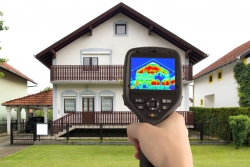Save Money and Energy with these Tips
With so much energy information being thrown about, it’s easy to get confused and overwhelmed. Here are some simple and straightforward energy tips that will take your energy efficiency to the next level.
- Get an audit. If you’re serious about investing in efficiency, it’s just a no-brainer. End of story. Use a BPI-certified auditor and get a blower door test, IR camera, and duct blaster (if applicable) along with a combustion safety test. The whole enchilada. This will provide you with all of the information you need to prioritize your investments in efficiency. If you are unsure about your willingness to invest but a local utility or organization offers cheap audits, take that incentive and run.
- Go under-the-radar. Think outside the “take shorter showers” and “use LEDs” kinda box we’ve all become used to. Here are some lower profile but potentially significant opportunities for efficiency gains:
- Chimney balloons
- Recessed can covers
- Smart power strips
- Low-flow showerheads
- Faucet aerators
- Radon fans
- Seal the envelope. With or without an audit, the surest way to long-term energy savings is by sealing up the home’s conditioned area, especially its top and bottom. Leaks and gaps around recessed can lights, attic hatches, dropped ceilings, and crawlspace floor joists can greatly increase the flow of outdoor air into the home year-round. Fireplaces, windows, doors, and HVAC/plumbing penetrations can leak and make you uncomfortable. To seal all of these areas right you’ll probably want to hire a contractor, who can also ensure that your building envelope is well insulated.
- Right size. When it comes time to replace an energy user, don’t just buy efficient. If you’re replacing a space heater or cooling unit, make sure that your contractor performs a Manual J load calculation in order to size the equipment to your current needs. Investigate the opportunity to switch heating fuels as well.
- Consider the sun. Although conventional energy wisdom holds that one should eat efficiency vegetables before indulging in a renewables dessert, there are worse sins than investing in solar photovoltaics. Just do it with your eyes wide open. In other words, use a trusted cost-benefit estimator rather than blindly accepting the rosy outlook of a contractor.
For more thought-provoking energy information, check out CSU Extension’s Your Energy Colorado website, including our new solar calculator!



When is the best time of year to do an energy audit on your home?
If you are looking to do a home energy audit that includes use of an IR camera (recommended), the best time is when it’s either very cold or very hot. In those conditions, leaky or poorly insulated areas of the home are magnified with the camera. Aside from that, the best time is when you’re motivated!
Thanks for the tips. I’m new to the idea of installing recessed can covers, can you purchase these at any home improvement store and install them yourself?
Hi Shelia, yes you can at least purchase them at most big box stores. They are fairly simple to install. In your attic, you would clear any insulation away from the recessed cans, place the cover over it, cut any slits needed for existing wiring, seal the cover to the attic floor with a fire resistant foam (if you really want to do it right), and replace the insulation. Some covers are advertised to work with any type of recessed can, although experts still warn against placing them over cans that are not “IC rated” (for insulation contact). To reduce fire danger, use them along with LED lights in the can.